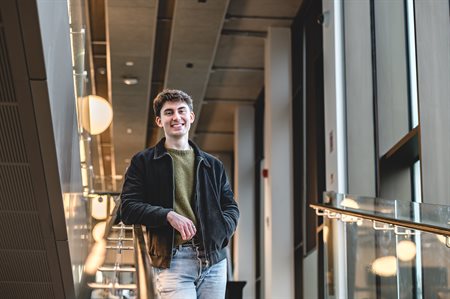UoB 125: Being a student during the pandemic vs now
This year, UoB turns 125 years old. The university has lived through a lot of history in that time and, in recent years, UoB’s widespread communities had to learn how to navigate the global Covid-19 pandemic.
Written by Student Content Shaper Dean Turner

I’ve been asked several times why I decided to start university in 2020, during the Covid-19 pandemic. It’s a good question. Why begin university just when almost everything that makes it valuable and fun—meeting new people, joining societies, gaining skills—risked spreading a virus?
Honestly, I started university during Covid because there wasn’t much else to do. I didn’t have a social life beyond online games and a political philosophy book club I started with friends over Zoom. What I did have was more free time than I knew what to do with, and a job at Tesco, which led to me catching Covid in March 2020.
I won’t pretend I didn’t enjoy the free time at first. After a decade of my life structured by school, it felt liberating to be without a schedule. But apart from the drama of A-level results day, the summer lockdown wasn’t very exciting.
I recognise the privilege in this. Covid was devastating for many—those who lost loved ones they couldn’t properly say goodbye to, and the NHS workers who were applauded but not supported. There was nothing to ease this pain. You couldn’t even hug one another.
The new normal
On 20 September 2020, I moved into halls at the University of Birmingham. I was nervous but excited. Lugging heavy bags up three flights of stairs (there was no lift in my block in Oak Brook Park) felt momentous. After I had moved in and my mum left with a teary goodbye, the reality hit—this was my new home for a year. Apart from the mask-wearing, moving in was probably the most typical part of my first year.
Studying Philosophy, I had pre-recorded lectures on topics ranging from moral and political philosophy to Descartes’ substance dualism and formal logic. I even took part in society events on Zoom. One of the first was organised by the Philosophy Society. It was a very interesting experience. The society’s flagship ‘Think & Drink’ event was not being held in a pub but in my bedroom—it was in many people’s bedrooms, simultaneously.
My daily routine remained just as disorganised as it had been in the summer lockdown. I would wake up at some indefinite time and try to consume as many pre-recorded lectures as I could. Once I had finished academic work, I would either log onto Zoom for a society event or socialise with my flatmates in the evening, which usually involved ordering food and watching films. Within the first two weeks of term, however, any prospect of experiencing anything like regular university life was paused as a flatmate tested positive for Covid.
Making the most of university life
This way of life did come to pass though. When restrictions lifted in time for my second year, I was overwhelmed with the opportunities that were suddenly available, but excited to get stuck into them. It wasn’t a seamless transition back to business-as-usual for students or academics. I remember the feeling of anticipation before my first in-person lecture in the Arts building. It was on the philosophy of art, and I remember seeing the lecturer’s hands tremble as he began—I suppose he was nervous after a year of recording lectures from home.
I think starting university during Covid taught me to truly appreciate real-world spaces. Forgive me for waxing philosophical about lecture theatres, but I’m not sure we appreciate them enough. Sure, some of them are a bit tired-looking, and there is never a plug nearby when your laptop is about to die, but it’s in these places where university happens. The room where I had that first in-person lecture, the corridors and staircases I walked down with friends afterwards, and the buildings I passed by on the way home will always be significant to me.
My first year was very atypical, looking back. I didn’t have nearly as many opportunities to engage in university life as I do now, but I didn’t know what I was missing at the time. The feeling of embracing uncertainty and trying to thrive in less-than-ideal conditions characterised my first year, but it resulted in me taking every opportunity I could once restrictions lifted: I joined societies, ran for committee positions, tried out new sports, applied for jobs, and even ran in the Guild elections!
I’m due to graduate from my Master’s course this year, and I’m comfortable saying that I don’t regret starting university when I did. I’ve more than made up for anything I missed out on during my first year in the years since.
Help us celebrate our 125th anniversary by sharing your story. Whether it’s a cherished memory, a favourite spot, or a moment which makes this University feel special to you, pitch your idea to studentcommunications@student.bham.ac.uk.